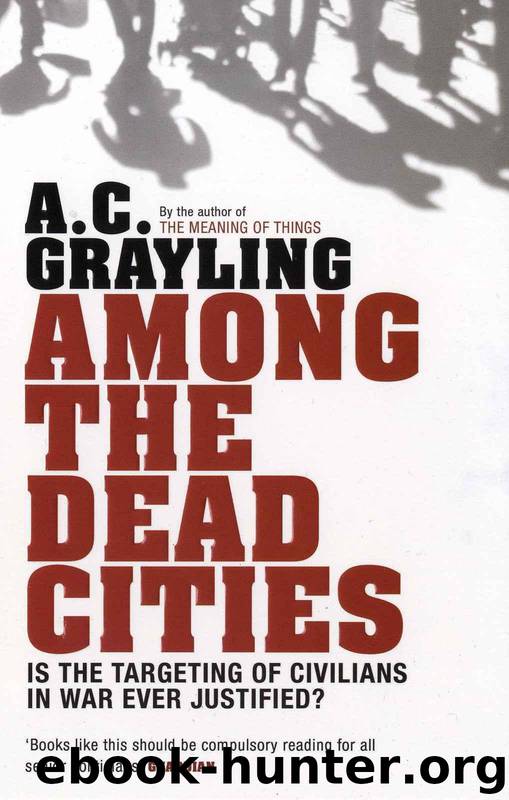Among the Dead Cities by A.C. Grayling

Author:A.C. Grayling
Language: eng
Format: mobi
Publisher: Bloomsbury UK
Published: 2011-11-07T00:00:00+00:00
5
Voices of Conscience
There were more conscientious objectors in the First than in the Second World War for the good reason that the latter was, from the Allied point of view, a justified war, and widely understood to be so. It was justified because it consisted in resistance to the unarguable fact of military aggression by jack-booted Fascism. But there were people for whom it mattered that the war should be not only a justified one, but a justly fought one, and to whom therefore some of the Allies’ actions were unacceptable. One thing such people were concerned about was the blockade of continental Europe, in light of the suffering it caused to those in occupied countries such as Greece where, for a time, famine threatened.
But a much greater concern was the area-bombing campaign. In the summer of 1941 a Committee for the Abolition of Night Bombing was set up by the British Quaker pacifist Corder Catchpool, who had been a volunteer ambulance driver in the First World War until conscription was introduced. Then, because he refused to take part in any alternative to military duties which might aid the war effort, he was sent to prison for two years’ hard labour. After the outbreak of the Second World War he was impelled by two things to set up his committee against night bombing: the experience of the Blitz, and a letter to The Times newspaper on 17 April 1941 from George Bell, Bishop of Chichester, who asked, ‘if Europe is civilised at all, what can excuse the bombing of towns by night and terrorising of non-combatants?’ In his letter Bell called on both Germany and Britain to forswear the tactic, and Catchpool decided to lobby to try to get at least his own country to comply.
Catchpool’s commitment to the cause of peace was a deep and active one. While still in prison in 1918 he published an account of his experiences as both pacifist and prisoner.1 After his release he went to Germany to work for the Friends War Victims Relief Committee, set up to further the task of reconciliation between the combatant nations. He remained in Germany for a time after the Nazi regime came to power, but his help for Jews attracted the attentions of the Gestapo, and he was arrested and interrogated by them. He returned to England soon afterwards. He had no illusions about Nazi Germany, but he adhered to his Quaker pacifist principles despite that.
Among those Catchpool invited to join his committee were Professor Stanley Jevons, T. C. Foley, Stuart Morris, and the novelist and eloquently vocal pacifist Vera Brittain. Not all of its members were pacifists like Vera Brittain and Catchpool himself, but they were all deeply opposed to bombing civilians. The committee’s first endeavour was to organise a petition asking the British government to give up bombing by night; surprisingly for the time and circumstances, the petition gathered 15,000 names, among them those of three bishops, six Members of Parliament, and a mixture of pacifists and non-pacifists.
Download
This site does not store any files on its server. We only index and link to content provided by other sites. Please contact the content providers to delete copyright contents if any and email us, we'll remove relevant links or contents immediately.
The Radium Girls by Kate Moore(12028)
100 Deadly Skills by Clint Emerson(4926)
Rise and Kill First by Ronen Bergman(4789)
The Templars by Dan Jones(4689)
The Doomsday Machine by Daniel Ellsberg(4490)
The Rape of Nanking by Iris Chang(4213)
Killing England by Bill O'Reilly(4004)
Stalin by Stephen Kotkin(3968)
Hitler in Los Angeles by Steven J. Ross(3946)
12 Strong by Doug Stanton(3550)
Hitler's Monsters by Eric Kurlander(3343)
Blood and Sand by Alex Von Tunzelmann(3205)
The Code Book by Simon Singh(3189)
Darkest Hour by Anthony McCarten(3133)
The Art of War Visualized by Jessica Hagy(3008)
Hitler's Flying Saucers: A Guide to German Flying Discs of the Second World War by Stevens Henry(2754)
Babylon's Ark by Lawrence Anthony(2679)
The Second World Wars by Victor Davis Hanson(2526)
Tobruk by Peter Fitzsimons(2518)
